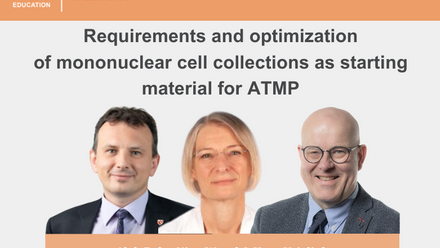The Cell Therapy by Design session included the following presentations:
1. Olga Zimmermannova: Reprogramming of dendritic cells for cancer immunotherapy
2. Ali Moazzeni: Leukoreduction filters (LRFs) as a novel source of CAR-NK cell based immunotherapy
3. Katharina Schallmoser: A Protein Corona Around Human Platelet-Derived Extracellular Vesicles Promotes Regenerative Functions
4. Abdullah Khan: Bone Marrow Organoids
MODERATORS: Sofia Frändberg and Mickey Koh
After the presentation, there was a questions and answers session of about 5 minutes, which is also included in the recording.
Abstract
Restoring tumor immunogenicity with dendritic cell reprogramming
O Zimmermannova
Immune evasion is an important hallmark of cancer ensured by diverse strategies, including immunosuppression and downregulation of antigen presentation. Here, to restore immunogenicity of cancer cells, we employed the minimal gene regulatory network of highly immunogenic type 1 conventional dendritic cells (cDC1) to reprogram cancer cells into professional antigen presenting cells (APCs). We showed that enforced expression of PU.1, IRF8 and BATF3 (PIB) was sufficient to induce cDC1 phenotype in 33 cell lines derived from human and mouse hematological and solid tumors. PIB gradually modified the cancer cell transcriptional and epigenetic program imposing global antigen presentation and cDC1 gene signatures within 9 days. cDC1 reprogramming restored the expression of antigen presentation complexes as well as co-stimulatory molecules at cell surface, leading to the presentation of endogenous antigens on MHC-I, and to CD8+ T cell mediated killing. Functionally, tumor-APCs acquired the ability to uptake and process exogenous proteins and dead cells, secreted inflammatory cytokines and cross-presented antigens to naïve CD8+ T cells. Importantly, tumor-APCs were efficiently generated at the single cell level from primary cancer cells of 7 solid tumors that presented antigens to memory and naïve T-cells as well activated patient-specific intra-tumoral lymphocytes. Alongside with antigen presentation, tumor-APCs harboring TP53, KRAS and PTEN mutations showed impaired tumorigenicity in vitro and in vivo. Finally, using in vivo mouse models of melanoma we showed that intratumoral injection of tumor-APCs promoted lymphoid infiltration, delayed tumor growth and increased survival. The antitumor immunity elicited by tumor-APCs was synergistic with immune checkpoint inhibitors enabling tumor eradication.
Our approach combines cDC1's antigen processing and presenting abilities with endogenous generation of tumor antigens and serves as a platform for the development of novel immunotherapies based on endowed antigen presentation in cancer cells.


